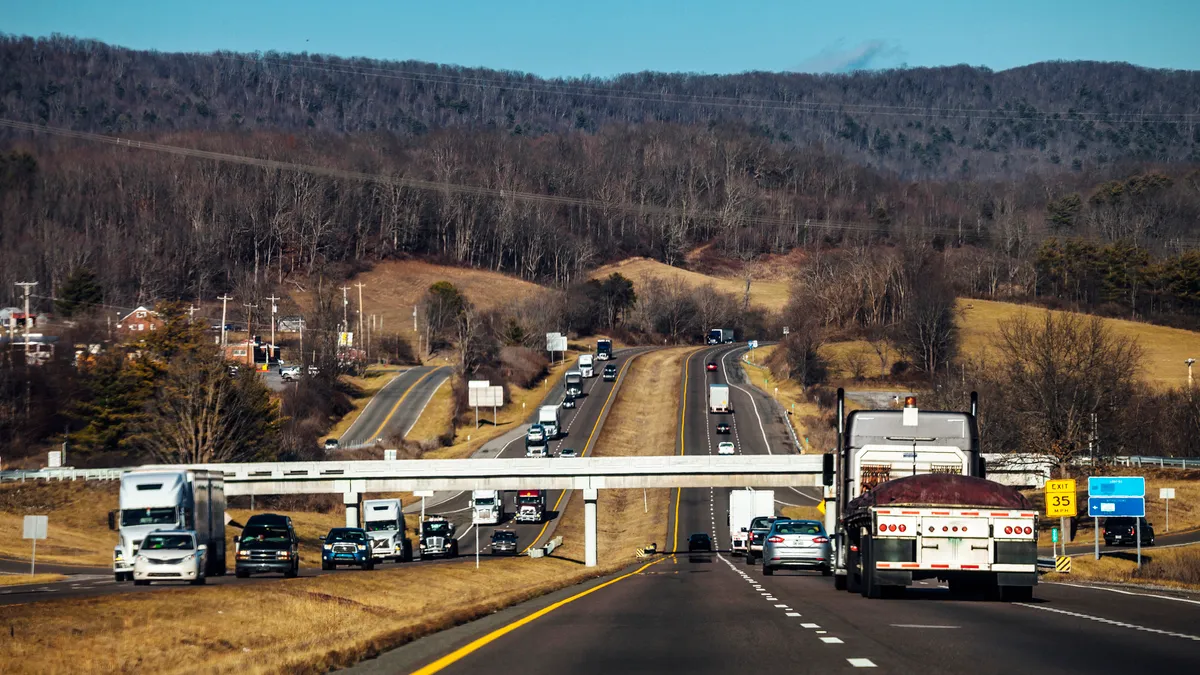Dive Brief:
- The FMCSA said on Friday it is proposing, and seeking public comments on, a pilot program to allow drivers age 18-20 to operate commercial motor vehicles across state lines. This builds on the agency's 2019 request for comments on a similar program.
- The new proposal would allow 18- to 20-year-old drivers with a CDL to operate on an interstate basis while taking part in a 120-hour probationary period, followed by a 280-hour probationary period under an apprenticeship program established by an employer. Or a driver who is 19 or 20, who has operated commercial vehicles in state commerce for a minimum of one year and 25,000 miles, could be part of the pilot program.
- Drivers in the pilot program would not be allowed to operate vehicles hauling passengers or hazardous materials or special configuration vehicles, according to the FMCSA. Forty-nine states and the District of Columbia allow drivers under 21 to operate heavy trucks. Hawaii does not.
Dive Insight:
As the FMCSA noted in its release, current law allows drivers under 21 with a CDL to make freight runs from El Paso, Texas, to Houston, or from Miami to Tallahassee, Florida. But a Virginia truck driver under 21 could not make a delivery in neighboring Maryland or Washington, D.C. The law is 82 years old.
When the agency opened its pilot idea up to the public in 2019, it received 1,118 comments — 504 commenters in favor and 486 opposed, the agency said. Other respondents voiced conditional support or offered other comments.
Among the proponents were stakeholders in the trucking industry, including the American Trucking Associations, National Tank Truck Carriers, training groups and logistics firms. The Owner-Operator Independent Drivers Association, Advocates for Highway and Auto Safety, and the Trucking Alliance were among the opponents. The Commercial Vehicle Safety Alliance, the Teamsters and others asked the agency for clarification, provided data or gave recommendations.
"Every time that the agency has proposed this, there's been a wide range of stakeholders, not just safety groups ... that have opposed this pilot program," Peter Kurdock, general counsel for Advocates for Highway and Auto Safety, said. "It really begs the question, why this is necessary at this point? And we don't really see why it is, especially ... when you have higher crash rates for younger drivers."
According to the FMCSA, opponents commented that the agency had not analyzed data from states that could provide information on safety records. Others said the agency should complete its under-21 military CDL driver pilot and analyze that data before starting a new pilot. That three-year pilot program began in 2018.
Some proponents of under-21 interstate drivers view it as a step toward addressing the driver shortage, which is among the industry's top concerns.
Trucking officials predicted in June that the shortage will worsen as the economy recovers from pandemic-related shutdowns. The COVID-19 pandemic has slowed down re-certifications of existing drivers, and the granting of new CDLs, Werner CEO Derek Leathers said. He and others have noted the pandemic-related slowdowns have exacerbated the driver shortage.
"When you start to see the economy turn ... you're going to see a huge capacity crunch," said Don Lefeve, president and CEO of the Commercial Vehicle Training Association, in June. "[The driver shortage] will go from nothing to on steroids."
The International Foodservice Distributors Association welcomed the proposal.
"As aging drivers retire and growing online purchasing increases long-term freight demand, this program provides a path to bring needed younger drivers safely into the industry," the association said in a statement. "Specifically, it addresses a critical obstacle to attracting new drivers."
S.L. Fuller contributed to this report.












